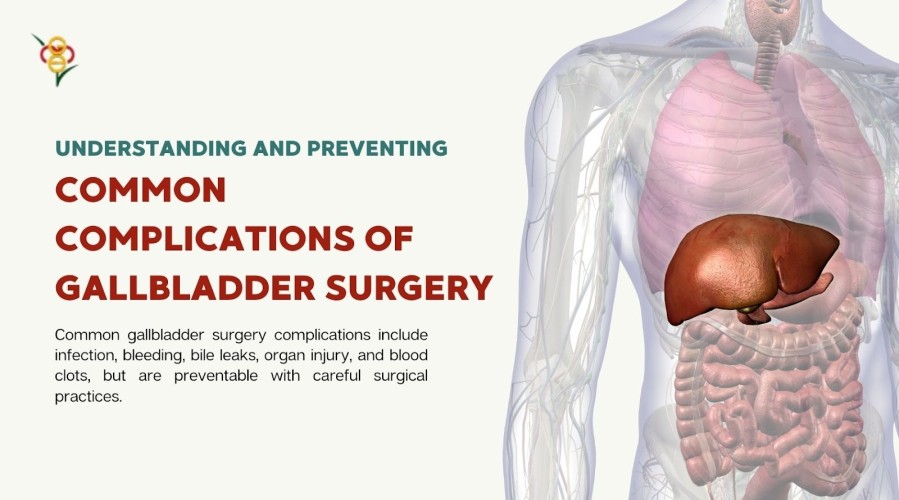Learn what gallstones are, their common symptoms, causes, and treatment options. Discover when to seek medical care and how to manage gallstone complications effectively.
What Are Common Complications of Gallbladder Surgery and How Can They Be Prevented

What Are Common Complications of Gallbladder Surgery and How Can They Be Prevented?
Gallbladder surgery, also known as cholecystectomy, is a common procedure often recommended for patients with gallstones or other gallbladder-related issues. The good news is that while it comes with potential risks, understanding these and taking preventive measures can lead to a smooth recovery and excellent outcomes.
Understanding Gallbladder Surgery Complications
Gallbladder surgery complications can occur, but being aware of them can help you stay prepared and proactive in your recovery journey:
1. Infection
Infections can sometimes occur at the surgical site or within the abdomen. Fortunately, with proper care and antibiotics, these can be effectively managed. Surgeons use sterilized equipment, ensuring that the risk is minimized right from the start.
2. Bleeding
Bleeding during or after surgery is rare, and surgeons are highly skilled in controlling it. In the unlikely event that it does happen, prompt medical intervention ensures it is quickly addressed, keeping you safe.
3. Bile Leak
A bile leak might occur if the bile ducts are damaged during surgery. With precise surgical techniques and careful monitoring, this risk is significantly reduced, allowing for swift and effective treatment if needed.
4. Injury to Surrounding Organs
Accidental injury to nearby organs is very rare. Surgeons use advanced imaging and careful techniques to avoid such issues, and any damage is immediately repaired, ensuring a positive recovery.
5. Blood Clots
Post-surgery immobility can lead to blood clots, but preventive measures like early mobilization, compression stockings, and blood thinners make this complication highly preventable.
Tips to Ensure a Smooth Recovery
Taking proactive steps before and after your gallbladder surgery can greatly enhance your recovery experience and minimize any potential risks:
1. Pre-Surgery Preparation
Adhering to pre-operative instructions is crucial. This includes fasting, avoiding specific medications, and undergoing necessary tests. Proper preparation sets the stage for a successful surgery and recovery.
2. Selecting an Experienced Surgeon
Choosing a skilled and experienced surgeon is essential. Do your research and seek recommendations to find a surgeon with an excellent track record, ensuring you're in capable hands.
3. Post-Surgery Care
Following post-operative care instructions meticulously is vital. Take prescribed medications, keep the surgical site clean, and attend all follow-up appointments. Proper wound care and hygiene are key to preventing infections and ensuring a smooth recovery.
4. Maintaining a Healthy Lifestyle
A healthy lifestyle supports a quicker and smoother recovery. Eat a balanced diet, stay hydrated, and engage in light physical activity as recommended by your healthcare provider. These habits promote overall well-being and aid in healing.
5. Staying Informed
Being aware of potential risks and recognizing the signs of complications allows for prompt action. Contact your healthcare provider immediately if you notice any unusual symptoms, ensuring any issues are addressed quickly and effectively.
Gallbladder surgery is a routine procedure with a high success rate. By understanding potential complications and taking preventive measures, you can ensure a smooth and positive recovery. Follow pre and post-surgery instructions, choose an experienced surgeon, and maintain a healthy lifestyle to minimize risks and achieve the best possible outcome.
Schedule an Appointment at GEM Hospital
If you're experiencing gallbladder issues or have concerns about gallbladder surgery, schedule an appointment at GEM Hospital. Our experienced team is here to provide the best care and guidance for your health needs, ensuring a positive and successful treatment journey
Blogs & Article
Learn about bloating and gas problems, including common causes, symptoms, and effective solutions to improve digestion, reduce discomfort, and maintain gut health.
Learn how unverified Ayurveda treatments may cause liver damage, understand the risks, symptoms, and why medical guidance is essential for safe care.


